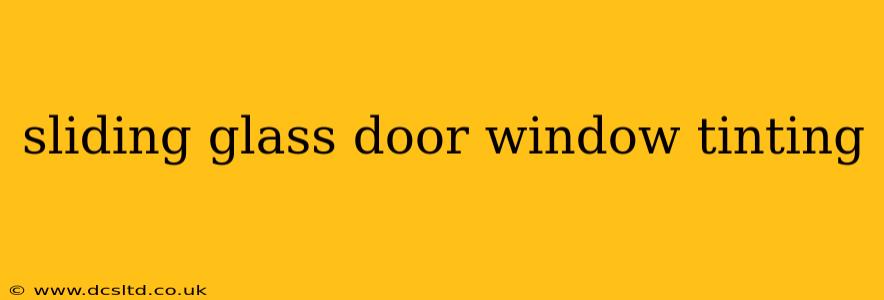Sliding glass doors offer stunning views and ample natural light, but they can also present challenges. Intense sunlight can lead to uncomfortable heat, faded furniture, and increased energy costs. This is where sliding glass door window tinting comes in. This comprehensive guide explores the benefits, types, and considerations for tinting your sliding glass doors.
Why Tint Your Sliding Glass Doors?
Tinting your sliding glass doors offers a multitude of benefits beyond simply improving aesthetics. Let's explore the key advantages:
-
Reduced Heat Gain: This is arguably the most significant benefit. Window tint effectively blocks a substantial portion of the sun's infrared rays, significantly reducing heat transfer into your home. This leads to lower energy bills, particularly during summer months. You'll spend less on air conditioning and enjoy a more comfortable indoor temperature.
-
UV Protection: The sun's ultraviolet (UV) rays are a major contributor to fading furniture, artwork, and flooring. Window tint acts as a powerful shield, preventing these damaging rays from reaching your interiors and preserving the vibrancy of your belongings.
-
Increased Privacy: Depending on the tint chosen, you can enhance your privacy by reducing visibility from the outside. This is particularly beneficial for ground-floor doors or those facing busy streets.
-
Glare Reduction: Intense sunlight can create uncomfortable glare, making it difficult to watch television or use electronic devices. Tinting significantly reduces glare, improving visual comfort and reducing eye strain.
-
Shatter Protection: While not all tints offer this, some specialized security films can help hold the glass together in case of breakage, offering an added layer of safety.
What Types of Tint are Available for Sliding Glass Doors?
Several types of window tint are available, each offering different benefits and levels of performance:
-
Dyed Films: These are the most affordable option, but they tend to fade over time and offer less UV protection compared to other types.
-
Metalized Films: These films use metallic layers to reflect heat and UV rays, providing superior heat rejection and longer lifespan.
-
Ceramic Films: These are considered a premium option, offering excellent heat rejection, UV protection, and superior clarity without the metallic interference that can affect signal reception.
-
Hybrid Films: These combine the benefits of different technologies for optimal performance.
How Much Does Sliding Glass Door Window Tinting Cost?
The cost of tinting sliding glass doors varies greatly depending on several factors, including:
- Size of the doors: Larger doors naturally require more film, increasing the overall cost.
- Type of film: Premium films like ceramic tints are more expensive than dyed films.
- Installer: Prices vary among installers, so obtaining multiple quotes is recommended.
- Location: Labor costs can vary by region.
What is the average cost of tinting a sliding glass door?
The average cost typically ranges from $100 to $500 per door. However, it's crucial to get personalized quotes from local installers based on your specific needs and door dimensions.
How Long Does Sliding Glass Door Window Tinting Last?
The lifespan of window tint varies depending on the type of film used, the quality of installation, and the exposure to the elements. High-quality films can last for 5-10 years or even longer.
Can I Install Sliding Glass Door Window Tint Myself?
While DIY installation is possible, it's generally recommended to hire a professional installer. Professional installation ensures a flawless, bubble-free application that maximizes the tint's effectiveness and longevity.
What are the drawbacks of tinting sliding glass doors?
While the benefits are numerous, it's important to be aware of potential drawbacks:
- Cost: While the long-term savings on energy bills can outweigh the initial investment, the cost of professional installation can be significant.
- Reduced Visibility (depending on the tint): While this can be a benefit for privacy, it can also reduce the amount of natural light entering the room. Choose your tint carefully to balance privacy and light transmission.
- Potential for Bubbles or Imperfections (with DIY installation): Improper installation can lead to unsightly bubbles or wrinkles, diminishing the aesthetic appeal and performance of the tint.
By carefully considering the various factors discussed in this guide, you can make an informed decision about whether sliding glass door window tinting is the right choice for your home. Remember to obtain multiple quotes from reputable installers to ensure you receive the best possible value for your investment.
